Blog Archives
‘Water for Elephants’ a Sensational, Poignant, Uplifting Spectacle
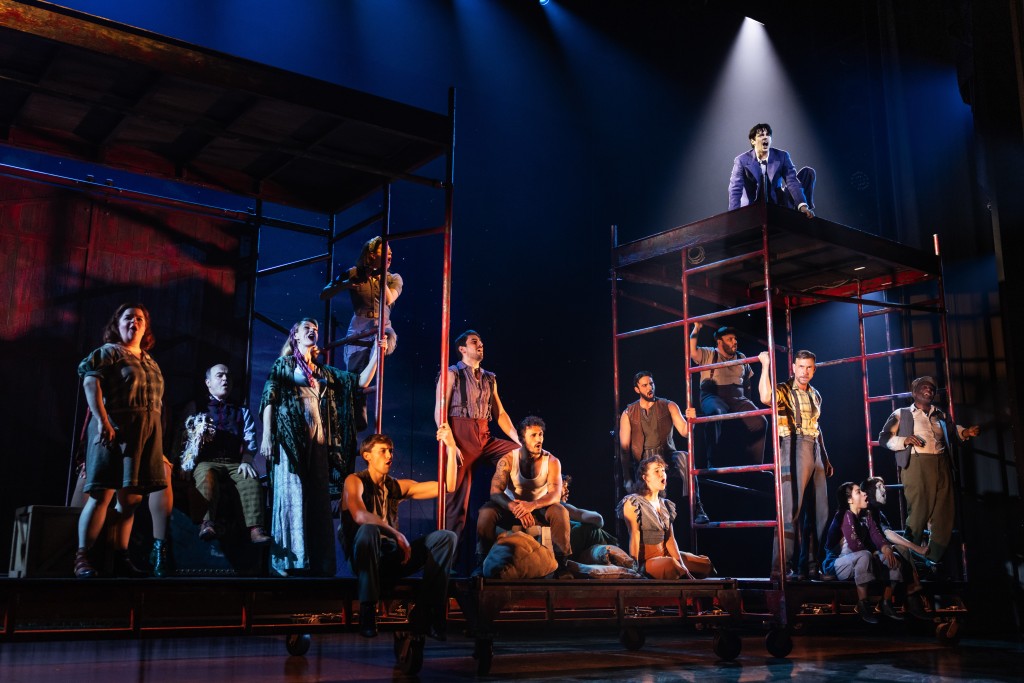
Based on the titular novel by Sara Gruen, Water for Elephants, excitingly directed by Jessica Stone, currently runs at the Imperial Theatre until September 8th. The production is a circus musical about redemption, love, courage and faith. With a book by Rick Elice and songs with a variety of dynamic musical styles and empowering lyrics by Pigpen Theatre Co., this is one of the finest, most rousing musicals to land its premiere on Broadway.
Water for Elephants richly incorporates the spectacle of the circus with stylistic artistry and well choreographed, impressionistic, acrobatic, aerial beauty. The company particularly embodies the spiritual essence of the beloved animals that are integral to the acts that barely keep solvent the foundering Benzini Brothers Circus, taken over by ringmaster/owner August (the excellent Paul Alexander Nolan).
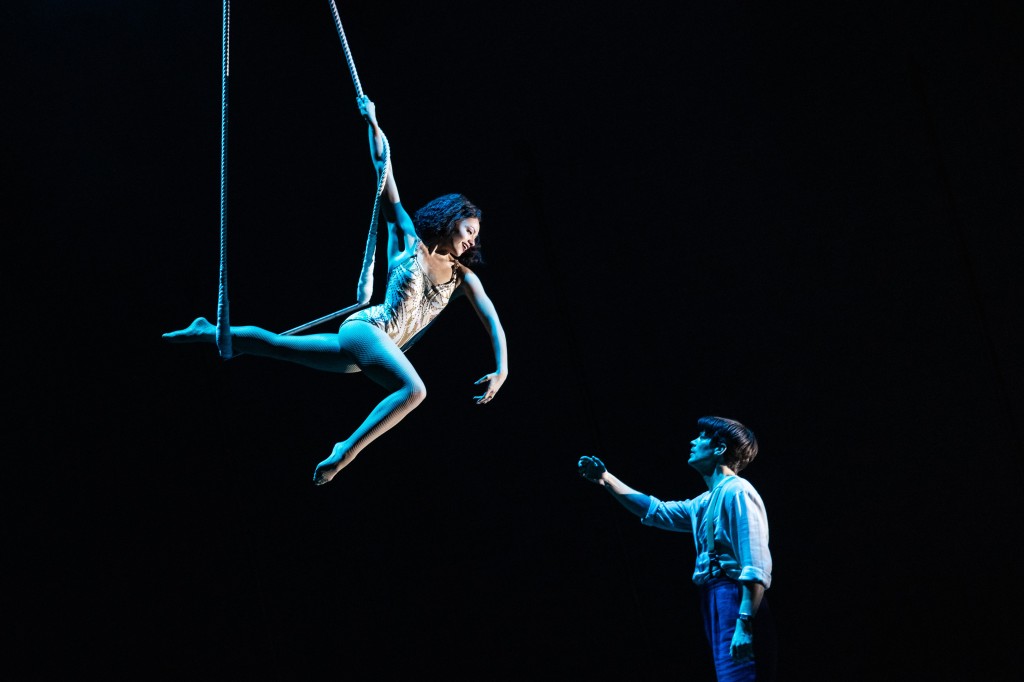
However, before the spectacle begins, at the top of the musical, a wizened, grey-haired, tall gentleman, Mr. Jankowski (the fine Gregg Edelman), appears. He is serenaded by ghosts of the past (Prologue) which remain obscure in our understanding until Charlie (Paul Alexander Nolan doubles in two roles), returns Mr. Jankowski to the present from his reverie, and Jankowski good naturedly comments that he enjoyed O’Brien’s One-Ring Circus. As June (Isabelle McCalla) and Charlie make sure everyone is packing up, a few turns of dialogue later, the elder gentleman comments that June’s horse could use “a stress test.”
Immediately, we realize that Jankowski’s knowledge is particular. And when he says he is there alone because his kids were too busy to come with him, and he’s escaped from the “home” and that will put the nurses in a tizzy, we are intrigued by what deep element in his psyche has brought him to this small circus. Affable and pleasant, Jankowski ingratiates himself with Charlie and June. Warmed up by his inside knowledge of circus jokes, Charlie says Jankowski can use his phone to call a cab to return him to the “home.” In the interim, June offers to show him around as they discuss his involvement in the circus of yesteryear and the differences between then and the present-day. Finally, Jankowski, a former animal vet, offers to look at the mare that “needs a stress test.”
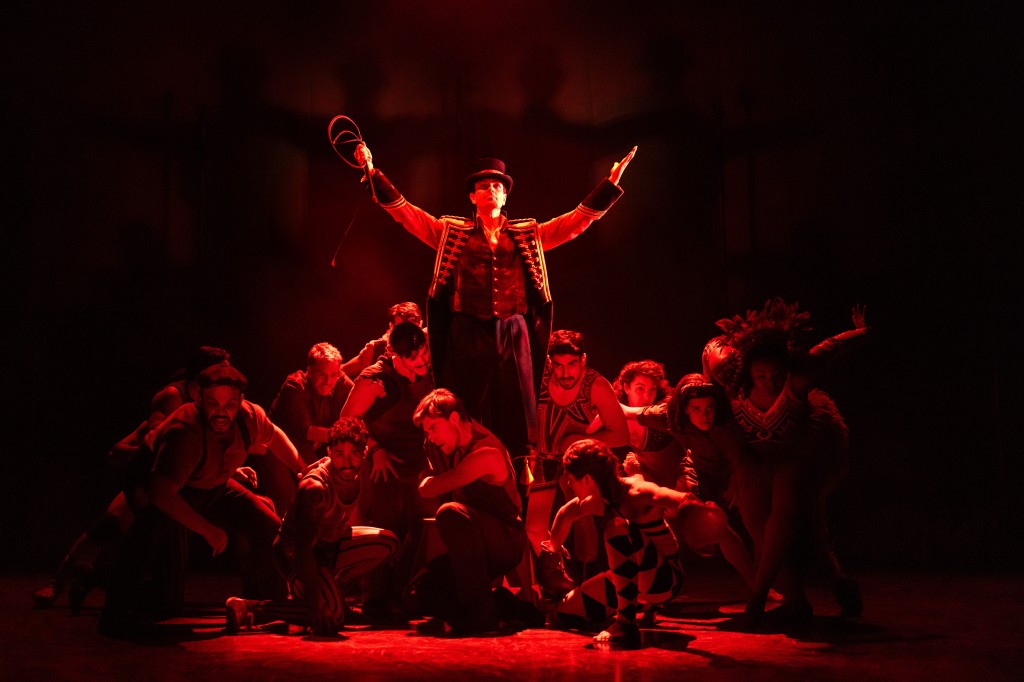
From this segue, the arc of development begins and Edelman’s Jankowski genially and intelligently narrates his involvement with the circus. As we move into the flashback, Edelman deftly walks us into the past. It is during the depression and Grant Gustin portrays Jacob Jankowski as a young man. In an amorphous scene of memory and voices, the older man sees his younger self reacting to the news of his parent’s death in a car accident, after which he was orphaned and left homeless. The powerfully voiced Gustin’s Jacob lives hand to mouth fending for himself. Hoping things will be better somewhere else, his destitution places him with other hobos on a train going wherever the wind blows them, (“Anywhere/Another Train”).
Jacob’s fellow riders Camel (Stan Brown) and Wade (Wade McCollum) are ready to throw him off this special train, but Jacob roundly stands up to Wade’s bullying aggression. Afterward, the two men who are roustabouts tell Jacob he hopped on a circus train and he can ride with them to the next town and stay for a day by making himself useful. There is fierce competition for every job, and he needs to distinguish himself to stay around permanently.
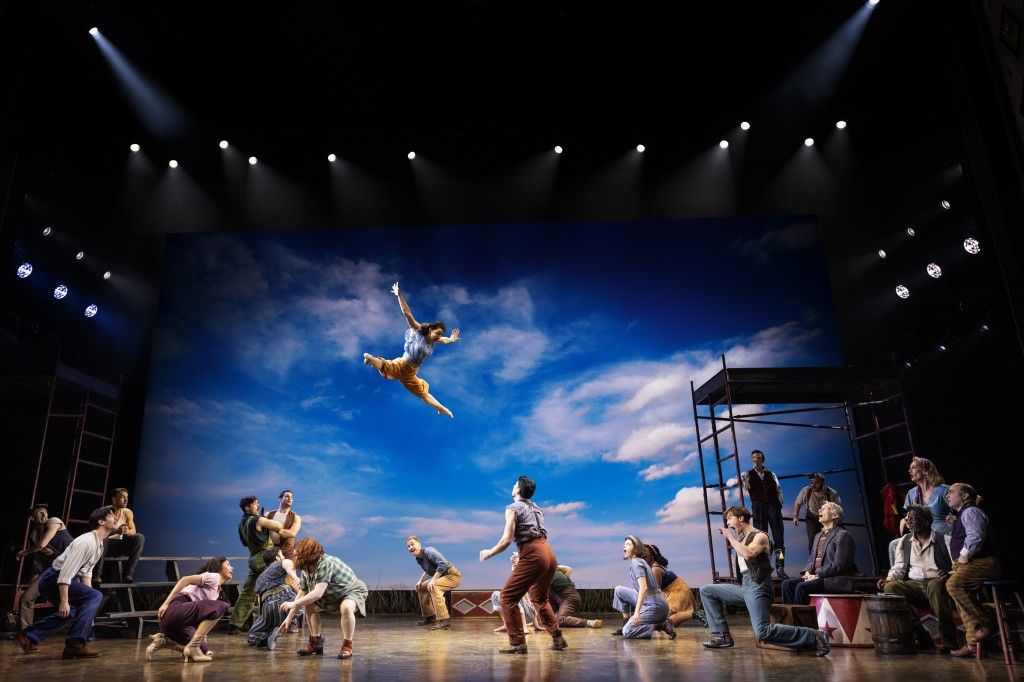
The stylized sets by Takeshi Kata in this scene of fast pacing movement are scaffolds on rollers which suggest a moving train with the help of the company, who create the bouncing motion which suits the rhythms of the music. Camel, who empathizes with Jacob, is the one who persuades Wade to allow him to stay for one day. Since Jacob elects to work with the menagerie, Camel tells him after they arrive in Utica and start setting up, he can earn his day’s keep by shoveling “s%$t.”
Director Jessica Stone and her creative team, which includes Shana Carroll’s circus design, Jesse Robb & Shana Carroll’s choreography with Mary-Mitchell Campbell & Benedict Braxton-Smith’s music supervision and arrangements, reimagine the interior, backstage world of the circus, of roustabouts, and the odd mix of personnel attracted to the nomadic, unique, showmanship of circus performance. In the musically synchronized “The Road Don’t Make You Young,” Jacob tours the circus and sees the insider’s scoop. The company of singers and acrobats swing mallets to stake the ropes for the Big Top and do daring twists and thrusts high into the air to commit muscular feats that take one’s breath away and rival the masters of Cirque du Soleil.
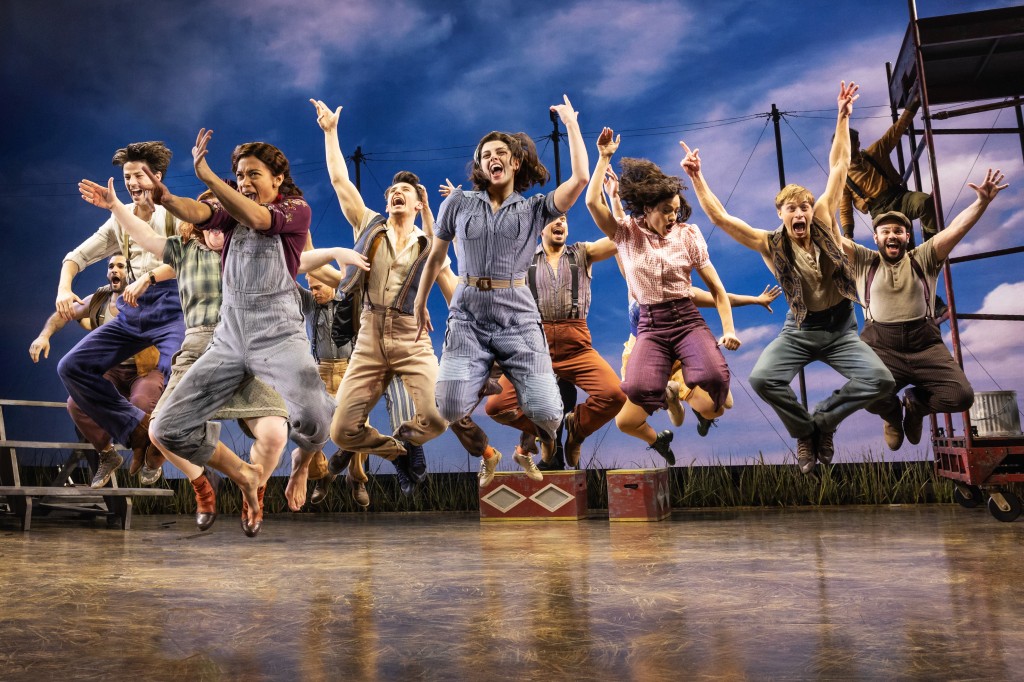
Jacob is nonplussed, figuring he will only stay one night, but is amazed to meet Agnes the Orangutan (Alexandra Gaelle Royer cutely re-imagines the reputedly smartest ape). Introduced to Barbara (Sara Gettelfinger), the mothering lead dancer of the “cooch tent,” Barbara tells him to get some grub and act as bouncer. Wade (August’s deadly right arm), renames her act to “Barbara and the Bally Broads,” and elevates them from the side show to the Big Tent to do “less strippen and more dippen.” Gettelfinger in a minor part plays it to the hilt.
As the song continues, Jacob, nicknamed Jake, also meets knife thrower and clown Walter (the humorous Joe De Paul), and Queenie his dog (a fluffy, long haired, hand puppet skillfully authenticated as a pooch by whomever “handles” her). By this juncture, Jake has met all those, who have been worn out by traveling the adventurous, road except the puppet master who keeps all in line. To conclude “The Road Don’t Make You Young,” owner August Rachinger presents himself center stage as the Broadway audience goes back in time to become the Benzini Brothers audience. In typical one-up-man ship razzle dazzle, Nolan’s ringmaster sings, “You wanna see something to set your spine tingling, something that blows Ringling out of the Ring?”
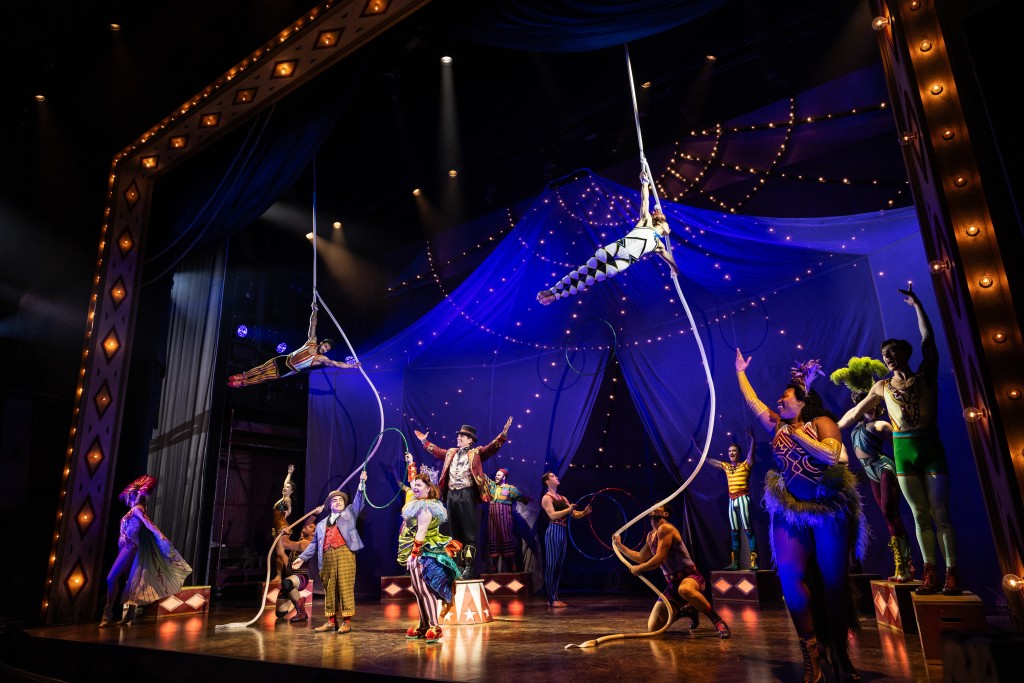
We question. Is he for real or just another blowhard exaggerating that chaff (the empty hull of a grain of wheat) is the meaty kernel of substance as he pretends his circus is finer than Ringling Brothers?
Unlike the quaint audience of the 1930s, who could not fathom black holes in space, television, quantum physics, cell phones, space stations orbiting the earth, Social Media and AI, we are the audience who experiences daily scientific wonders. What we’ve seen thus far on stage makes us understand August’s drive to be great in a time frame that is 90 years in the past before the dropping of the atom bomb. Additionally, we must consider that the parochial audiences of that time may rarely have seen a live lion.
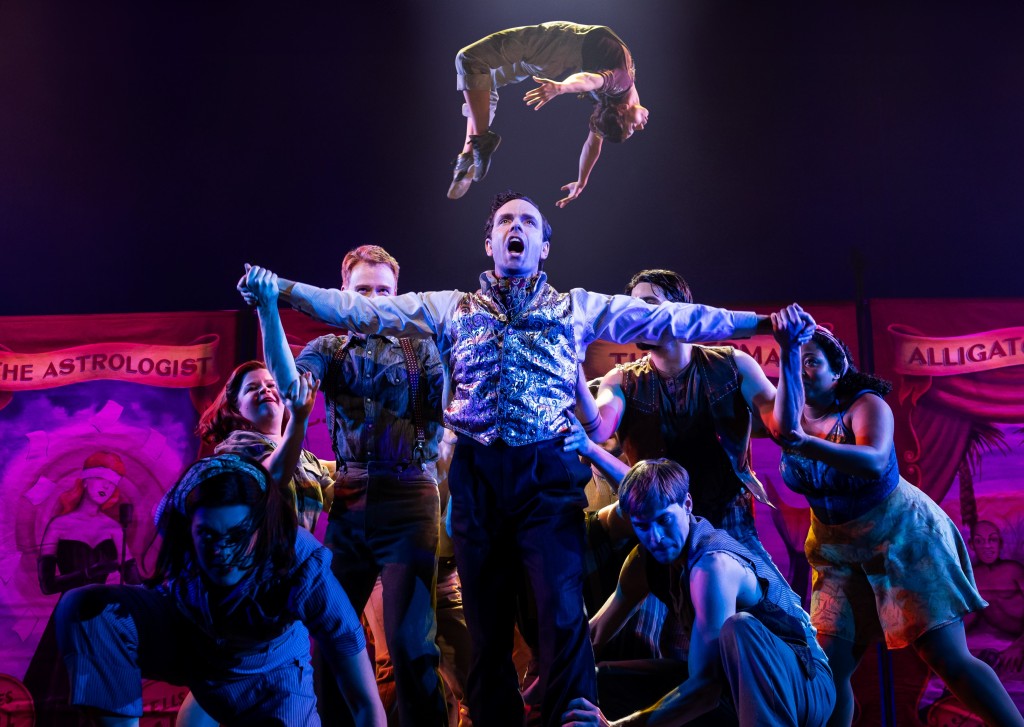
Our disbelief at August’s pronouncement is gradually suspended when the action moves back to the present with the elderly Jankowski. Charlie and June act amazed when he tells him that this circus was the famous Benzini Brothers of 1931. The crux of the story, how the foundering Benzini Brothers becomes THE Benzini Brothers of 1931, an outfit which made circus history, but not in a good way, is the substance of Jankowski’s tale.
The turning point for the circus and Jankowski’s narration begins at the encouragement of June and Charlie in the present. They want to know what happened. It is then Elice’s book returns us to the past, when Jake hears the limpid voice of Marlena (Isabelle McCalla also doubles as June). She coaxes and attempts to calm the ailing Silver Star (the horse she rides who brings in the crowds), out of his pain by singing, “Easy.”
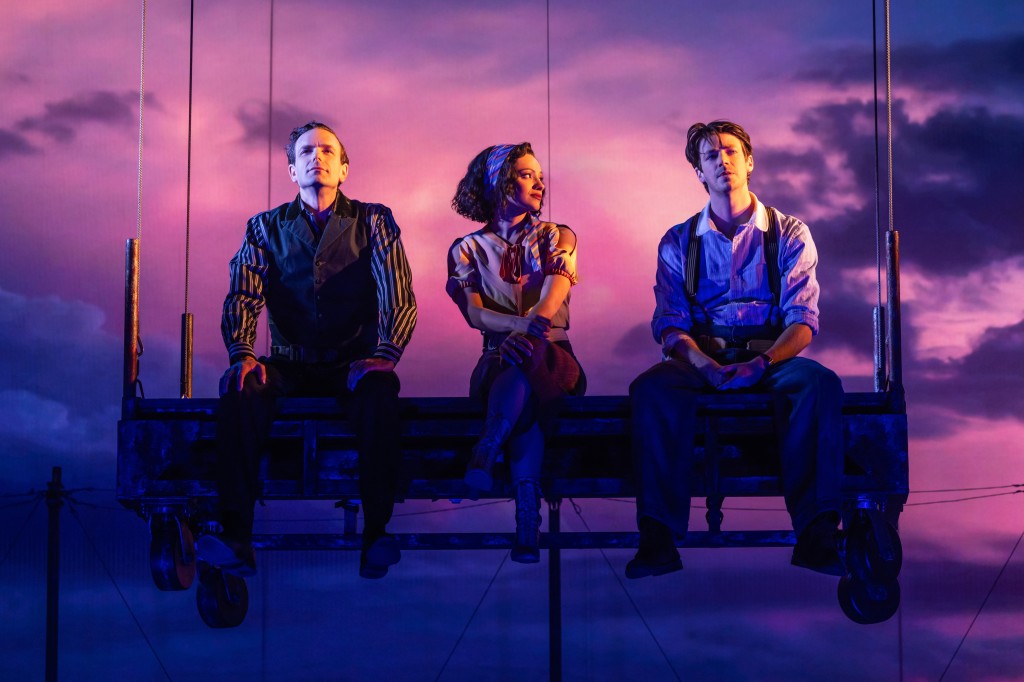
This is an exceptionally moving number as Antoine Boissereau infuses the agony of the horse with liquid movement aerially, as the white drapery flows with choreographed simplicity to effect his spirit struggle to stay alive despite his pained flesh. Jake is emotionally moved by Silver Star’s pain and the soulfulness of Marlena’s healing song. However powerful Marlena’s love is, Silver Star needs weeks of rest and recuperation to return to the center ring. If he doesn’t heal he will be lame, a death sentence for a star horse. Jake, uses the knowledge he has learned at Cornell as a vet, and his father’s experience as a vet. He tells August, who Jake finds out is Marlena’s husband, that the situation is dire for Silver Star.
August has him mercifully kill Silver Star which is a dramatic moment created by the Boissereau’s artistry. By that point August realizes Jake’s value and offers him a job. Jake avers because he realizes the pressure and tension he will be under having fallen for Marlena and having to live under the watchful and sinister monitoring of August whose behavior, at times is cruel and bellicose. When the train arrives too late at Wilkes-Barr, Pennsylvania where they try to get a replacement horse, they discover only Rosie is left for them to buy. August purchases her, and then is told she is an elephant, and they discover a truth her caretaker shares after purchasing her. She is one of the dumbest creatures anyone has ever worked with.
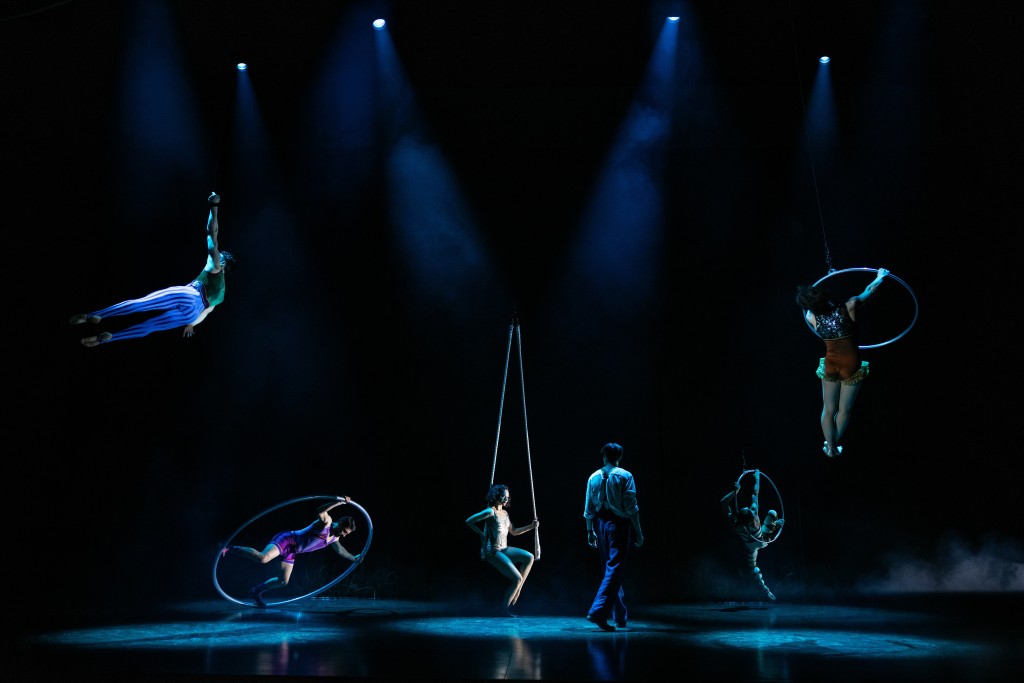
Humorously, not only has Jake fallen for Marlena, he falls for Rosie, who appears first as a trunk, then as various parts of an elephant in a clever “keep the audience wondering” if she will ever appear as the whole package. Interestingly, there is a meld of time, of present and past so that the elder Jankowski and Jake and Marlena sing the praises of Rosie (“Ode to an Elephant”) in another of Jankowski’s reveries.
With transformative hope, Marlena and Jake work together with Rosie as August suggests, while he sinisterly comments that Jake will never have Marlena and in effect threatens him away from her. Nevertheless, Rosie, Marlena and Jake work to try to get Rosie to do tricks with Marlena. In these sequences with Rosie the past is the present. Mr. Jankowski relives the hard work they go through with Rosie, who just doesn’t get much of what they are trying to teach her. (“Just Our Luck”) (“I Shouldn’t Be Surprised”)
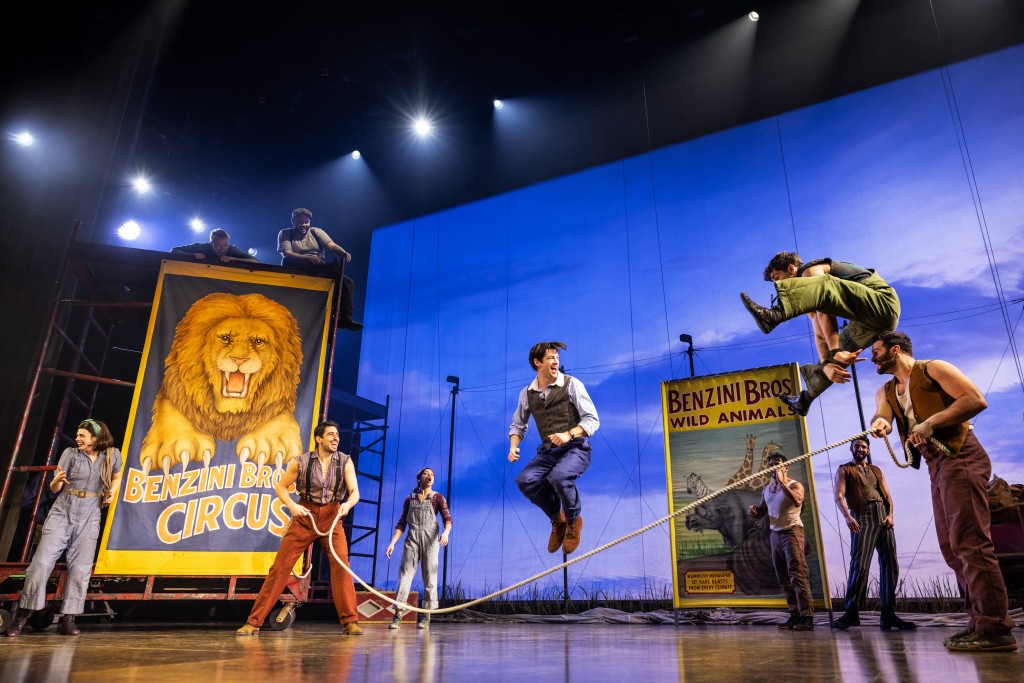
Meanwhile, if they can’t get Rosie in the center ring with Marlena as their main attraction, the circus which was foundering will completely fail. They need a miracle. Wisely, Stone teases the audience with what it wants to see, Rosie in full regalia as the beautiful elephant that all, including the company, have been singing about. Tantalized, we see the shadow of Rosie whole, but have to wait for her in fullness, until after the romance between Marlena and Jake blossoms in a kiss that happens almost unconsciously and whose “tell-tale” signs of lipstick alert Camel to warn Jake that he won’t be able to handle the trouble August will bring upon him for stealing the affections of his wife. Likewise, Barbara warns Marlena off Jake. However, both cannot help themselves.
Despite Marlena not getting Rosie properly trained for her star performance, August pushes the issue because they are desperate for the money the act will bring. In “The Grand Spec” Nolan’s August and the company superbly whip up the crowd as we anticipate seeing Rosie do “her thing.” When he is left standing with no stars emerging, the humiliated August runs backstage and attacks Rosie and beats her, trying to get her to move. We hear her pained trumpeting cries, and then she defends herself and knocks down August. She is ready to stomp him when the miracle happens.
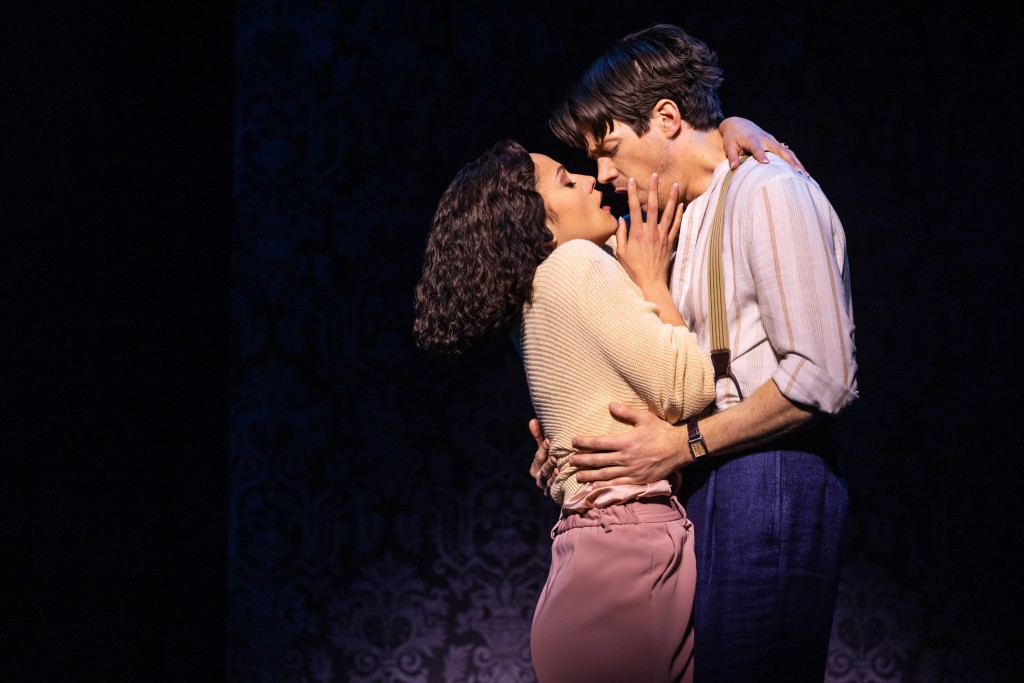
Jake in the twinkling of an eye reacts and Rosie stops herself from killing August whom she hates. The day is saved and the audience finally sees Rosie in full form. She is awesome in all her glorious, sensitive puppetry thanks to Caroline Kane, Paul Castree, Michael Mendez, Charles South and Sean Stack. “The Grand Spec” concludes and August finally becomes what he’s dreamed of being, the proud, successful “ringmaster extraordinaire.”
However, this achievement is at great cost, for he realizes he has harmed his relationship with his wife. Jake’s success with Rosie and August’s own cruelty and jealously have pushed Jake and Marlena together. She hugs Jake celebrating their success. Though she blows August a kiss, his inferiority and insecurity make him feel the loser. Nothing she can say and do will arrest his thoughts that Jake and his wife are lovers, though nothing but a kiss and hug has happened between them.
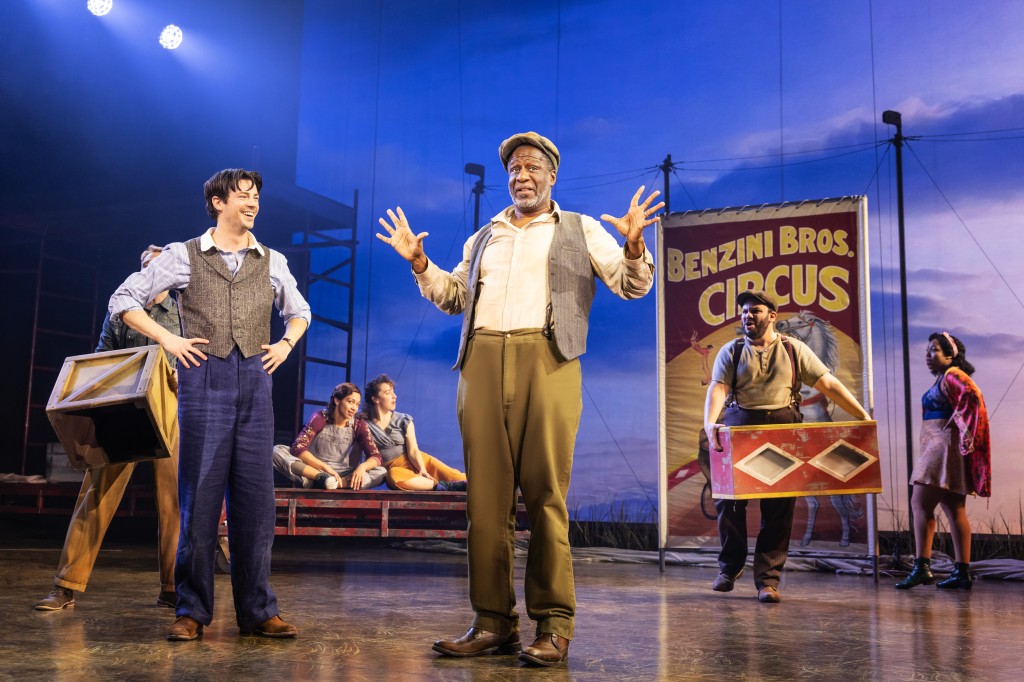
Thus, one problem is solved, however, unchecked psychologically, August, who should be thrilled with Rosie and Marlena’s sensational act, is driven toward distrust and anger. He drowns in his own bitterness that the reason why the act with Rosie is a success is because of, Jake, who has become invaluable.
Act II unfolds as the conflicts increase among August’s circus people and himself as well as August, Rosie, Marlena and Jake. In the first act we have a clue to August’s character (“The Lion Has Got No Teeth”); he feels he is a worthless fake. Though he glories in it and embraces his lies, this attitude does nothing to uplift him. August allows his envy of Jake, who is his superior in attitude, personality, education and kindness to animals, to be his undoing. Instead of realizing Jake and Marlena love each other and it’s time to move on, his cruelty and thuggery (we see how Wade, his lackey, acts out August’s evil wishes) cause him to seek vengeance. This spills out onto others in his company, and we note that he becomes so loathsome, that he cannot even stand himself.
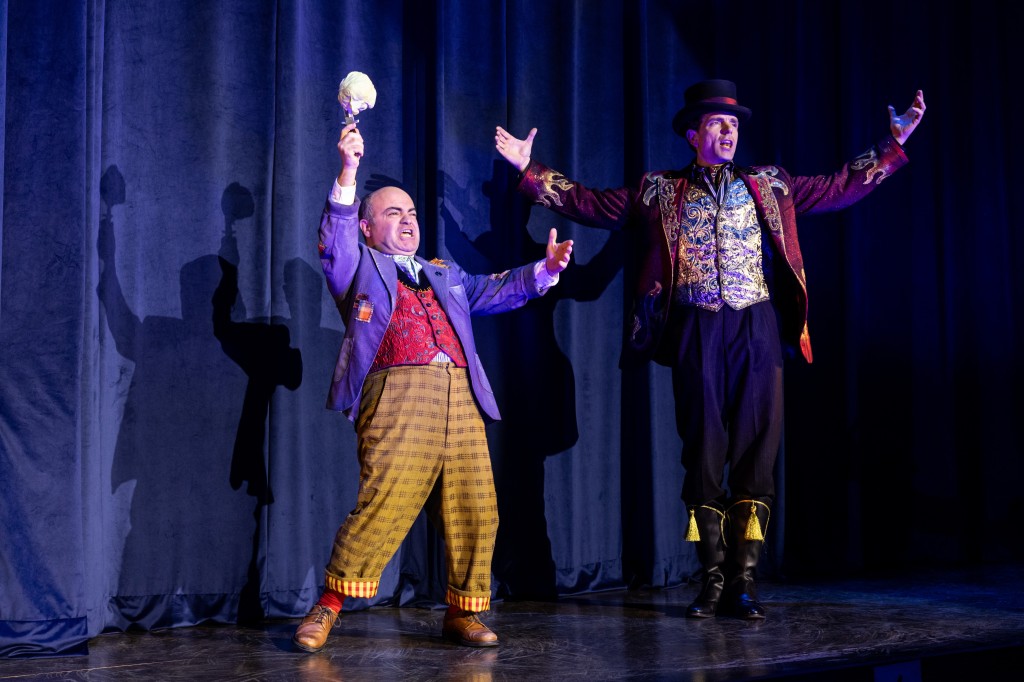
Nolan is the perfect, nuanced villain that we can understand because Elice’s characterization gives the actor so much to work with. Likewise, with the other characters who are strongly portrayed in song i.e. (“I Choose the Ride”), a song which Camel leads beautifully, we understand the choices the characters make. These ultimately lead to their victimization by August who becomes more and more tyrannical and vengeful without good reason. How he moves against Walter and Camel is terrifying, and McCollum’s Wade haplessly allows himself to be ill-used and exploited by August.
Once more we are reminded that evil flourishes because potentially good people do nothing to stop it. In Wade’s instance, he services August’s wickedness for his own purposes, willingly becoming his slave.
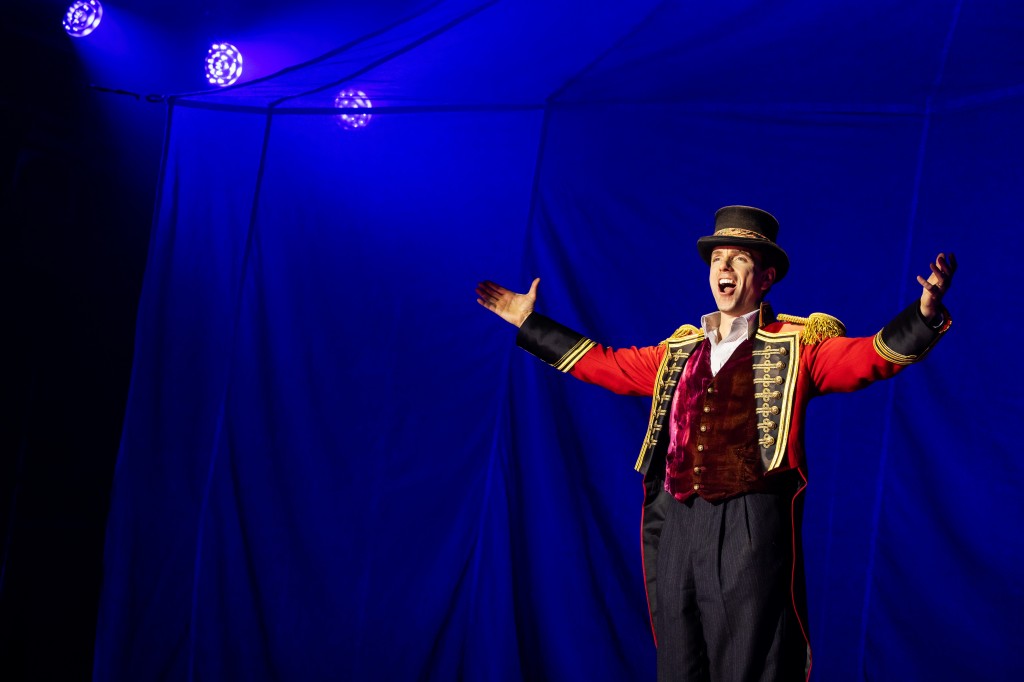
The energy and enthusiasm of the acrobatic dancers of Act I are even greater in Act II. Importantly, their action arises organically from the sequence of events that occur. Nothing the creative team does seems extraneous or out of place in the circus world. And it is a delight to watch their expertise and phenomenal talents singing, dancing and doing exploits during the various musical numbers which range from jazz, country, blues, ballads and more. The score and complex lyrics by Pigpen Theatre Co. have been reworked, honed and refined to precision.
This is one to see for the outstanding performances, the acrobatics and aerial spectacle which are extraordinary. The circus design makes sense in Stone’s creation of a small-time circus of 1931, run by a flawed ringmaster who attempts to keep things together, despite his interior brokenness. The director’s staging capture’s the novel’s ethos and heightens all the characters’ vulnerabilities. August’s failings make him the perfect foil for cruelty and exploitation. His darkness is made all the more evident in contrast to Jake, who in every way is his opposite, especially in his humility, gentility and decency.
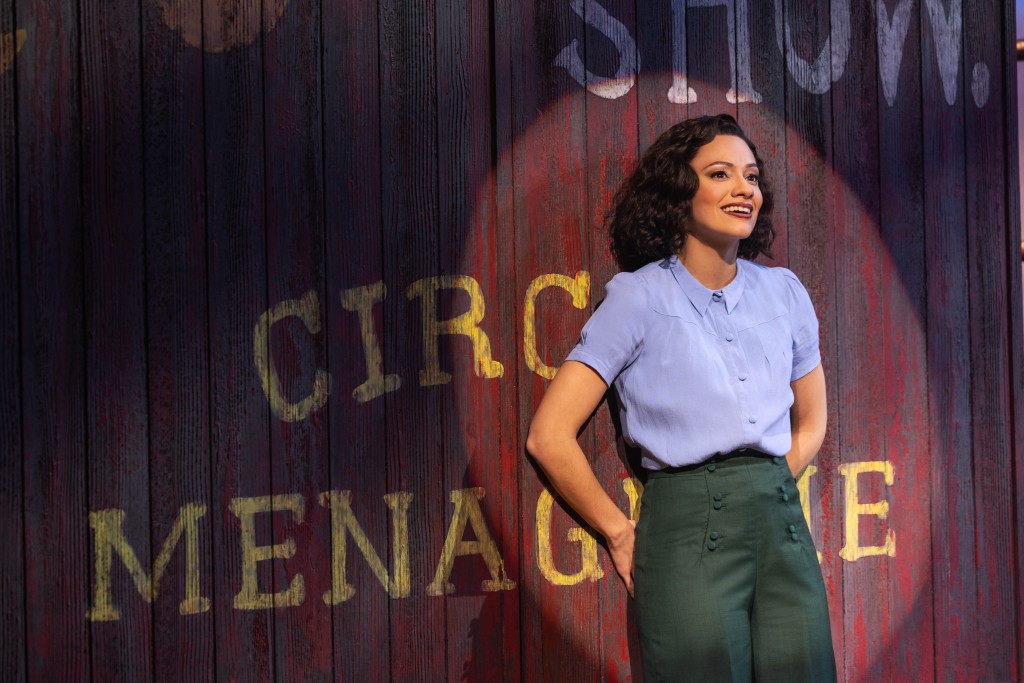
There is one scene taken out of Victor Hugo’s novel Les Misérables, which clues in the differences in the soul conflict and morality between August and Jake. Jake has the opportunity to kill August while the ringmaster sleeps. His goodness wins out and he stops himself. It’s a marvelous inclusion in an intricately woven, profound musical about individuals pressed by circumstances toward the abyss, until they free fall into their own inevitable demise.
Kudos to those not mentioned above which include David Israel Reynoso’s costume design, Bradley King’s lighting design, Walter Trarbach’s sound design, David Bengali’s projection design, Campbell Young Associates’ hair & wig design and Ray Wetmore & Jr. Goodman, Camille Labarre’s puppet design. Finally, the music was compelling thanks to Daryl Waters, Benedict Braxton-Smith, August Eriksmoen’s orchestrations, Music Director, Elizabeth Doran and Music Coordinator, Kristy Norter.
Water for Elephants. Imperial Theatre, 249 West 45th Street, between 7th and 8th. 2 hours forty minutes with one intermission until September 8th. https://www.waterforelephantsthemusical.com/
‘Slave Play’ by Jeremy O. Harris, An Explosive, Archetypal Look at Power, Sadomasochism and Oppression Through the Mythic Lens of “Black” and “White”

(L to R): Ato Blankson-Wood, Chalia La Tour, Joaquina Kalukango (kneeling), Irene Sofia Lucio, Sullivan Jones, Annie McNamara, Paul Alexander Nolan, and James Cusati-Moyer. in ‘Slave Play’ by Jeremy O. Harris, directed by Robert O’Hara (Matthew Murphy)
Slave Play by Jeremy O. Harris is a mind-bending, brain-slamming earthquake which will strike your soul and disturb you emotionally. Despite your desire to remain unaffected, you will react. Good live productions stir us. The finest plays rock us off our complacency and shatter our intellectual stasis. Slave Play, directed by Robert O’Hara, currently at the Golden Theatre, does that and more. Memorable and profound, it is the epitome of its sardonic genre. And in its ancient modernism, it rises to a level that melds tragedy and comedy.
The searing truths that run through Harris’ themes confound to a new clarity, especially if you see yourself as color blind and gender blind. Harris gouges out our assumptions and parades them in front of our unwillingness to perceive our hidden feelings about race, sex and power, teasing us in the process. By gaming his audience, Harris is all about stopping the games and taking off the masks. And he achieves this through the gyrations of his characters, three mixed-race couples who have sought therapy for their anhedonism (inability to feel pleasure-a symptom of depression and other ailments) with their partners.
The three couples sign up for “Antebelleum Sexual Performance Therapy” in order to expurgate their conflicts concerning race and sex that are ancient unconscious impulses or lesions borne from centuries of oppression in America from before the Civil War. It is an oppression that is in “black” and “white” unconsciousness that transcends skin color because the current society has historical remnants of the degradation of the “peculiar institution” which deformed the psyches of both masters and their slaves, the oppressors and the oppressed. Each couple suffers from these hidden twisted notions that they have ingested from living in American society. It has impacted them and they want a release from their suffering which manifests as alienation from their long-term partners.
This is a spoiler alert!

Joaquina Kalukango, Paul Alexander Nolan in ‘Slave Play,’ by Jeremy O. Harris, directed by Robert O’Hara (Matthew Murphy)
Only, you don’t know that at first. Indeed, initially as the play opens, we believe we are watching a scene from the antebellum South involving the abuses of the master slave relationships via sexual sadomasochism. With these scenes highlighting the sexual “play” of the marriage partners, Harris hits us between the eyes and in the core of our presumptions in the hope of laying bare the psycho-sexual racial myths that lurk in our souls.
Thus, everpresent in the scenic design by Clint Ramos is the plantation mentality: the desire to oppress and degrade employing the vehicles of sex. Using mirrors Ramos reflects the white southern archetype of the white antebellum plantation of Master MacGregor’s mansion that encircles the proscenium. Throughout most of the production, the projection of the white plantation remains in the background, symbolizing that we may think we have been released from our history, but it resides just below the surface of consciousness in our relationships and especially in our relationships with members of another race concerning issues of true intimacy and honesty.
It is in this plantation setting that the characters dig in to expose their sadomasochistic impulses from a racist past that they have unconsciously internalized and must expiate to heal their marriage relationships. Harris humorously twits the audience’s assumptions about black sexual prowess and sensuality in the opening scene with each mixed race couple as they play out their fantasies to free themselves of the bondages that hamper reaching a satisfying closeness with their partners.
Gary (Ato Blankson-Wood) and Dustin (James Cusati-Moyer) portray the gay couple who cannot please each other. They engage in the fantasy of master/slave verbal abuse donning fictional characters, Dustin as an indentured servant and Gary as a slave who has been put in charge of him. Through the play acting, Gary reaches fulfillment but in his response to this, he upsets Dustin. There is only a partial breakthrough, tenuous at best. They have not exorcised the notions that harm them.

(L to R): James Cusati-Moyer and Ato Blankson-Wood in ‘Slave Play,’ written by Jeremy O. Harris, directed by Robert O’Hara (photo by Matthew Murphy)
Phillip (Sullivan Jones) and Alana (Annie McNamara) portray a married couple who cannot achieve a hot intimacy until they enact their antebellum sex play. In their fantasy Alana is Master MacGregor’s wife and Phillip is her house slave who does what she wants. What pleases her is to take over the masculine role while he takes on the feminine role during a sexual encounter, something which makes her freer for intimacy with her partner. However, they too have issues because of Phillip’s race identity problems which he is loathe to admit and which to him are invisible.
The couple Kaneisha (Joaquina Kalukango) and Jim (Paul Alexander Nolan do not progress on this fourth day of the sexual fantastic. Jim finds the therapy ridiculous and demeaning. Ironically, it is Kaneisha who has engineered the roles and takes the lead in their improvisation. She portrays the slave and Jim (who has a British colonial accent-another irony) is the overseer who commands her unjustly, then sexually uses her as she uses him. But Jim finds her fantasy an impossibility and will not subject himself to it. Is this not a case of subliminal control and domination over his wife Kaneisha?
With each of the couples’ fantasies, there are strong elements of sadomasochism which are supposedly exorcised in the service of removing blocking psychic layers that impede the couples’ pleasure with each other. Unfortunately, Jim has stopped the process for all the couples. A condition of the therapy they have all agreed to is that if one cannot continue, all must not continue. When the couples meet to discuss and analyze what they felt during their fantastic sexual exploits exposing their sub rosa “plantation” mentality, the conflict is on. And Harris’s characterizations continue on a profound and humorous track as problems arise. Each couple ends up confronting their partner with results that are both humorous and poignant.
At this juncture social scientists and therapy guides Patricia (Irene Sofia Lucio) and Tea (Chalia La Tour) attempt to analyze and reaffirm their subjects’ positive changes as a result of the antebellum sexual play therapy. That the researchers do this in a controlled, manipulative way is an irony considering that all seek freedom from their internalized racial oppressions (the predator/prey elements of human behavior). Harris sardonically reveals these individuals, including the scientists, may be duping themselves into believing they’re getting closer to a “clear,” when what they seek cannot be achieved in a week-long process, regardless of how extreme the interventions. Perhaps, what has been internalized must be overthrown with individual introspection on the part of both partners after a long period of time. There is no quick fix except sustained love, growth, patience, understanding and the will to be close which eventually, through loving practice, will manifest. Maybe.

Annie McNamara and Sullivan Jones in ‘Slave Play,’ written by Jeremy O. Harris, directed by Robert O’Hara (Matthew Murphy)
The “liberal” posture which infects the “white” characters who are coupled up with their “darker” equally infected counterparts Harris explodes by the play’s end, as he disintegrates the notion that racism’s complexities may be dealt with through extreme interventions and quickie therapies. Especially for couple Kaneisha and Jim there has been a break through in their relationship at great cost to Jim who upon facing himself, dislikes what he perceives himself to be. Whether they continue together after this turning point doesn’t matter. Each have understood a soul revelation and will never be the same again.
Harris’ Slave Play instructs us about our perceptions, our attitudes and our willingness to go to that place that is uncomfortable to shed the pretense and stop pandering to faux racial equanimity and justice. That is why the curtain mirror that reflects the audience’s faces effected by Clint Ramos’s superb scenic design is a clever touch in keeping with Harris’ themes. The more visible reflections are for the audience members who are down front in the expensive seats.
Shouldn’t we examine our own proclivities and assumptions about sex, race and power dynamics? Or should we just ignore that there is a confluence of currents roiling in the subterranean waters of our souls about race? How do we overthrow our past and live freely without internalized cultural oppressions: misogyny, paternalism, institutional racism, body objectification, appearance fascism, sexism, chauvinism, reverse racism and impulses of white supremacy which move along a continuum from faint to furious? All of these oppressions impact our intimacy with ourselves and others, whether we are in mixed race relationships or not. Harris suggest we investigate these tantalizing questions which are not for the faint of heart.
As Americans steeped in a social history of racial power dynamics that continue today, though many are loathe to admit it, one cannot view this play as a light observer. To have the themes resonate, one should follow the characters to the most profound levels and then consider the myths, the conceptualizations about being black, white and gradations of both culturally. One must see with new eyes what has not been seen before at this crucial time when leaders speak to and embrace racist hate groups (KKK, Neo Nazis, etc.) curry favor with the likes of David Duke and Richard Spencer, and give political advisors like Steven Miller great power and moment over US Immigration policy with the precise intent to discriminate, promote fear and abuse for political purposes.

(On Ground L to R): Ato Blankson-Wood, James Cusati-Moyer, Sullivan Jones, Annie McNamara, Joaquina Kalukango, Paul Alexander Nolan. (In red boxes L to R): Irene Sofia Lucio and Chalia La Tour, ‘Slave Play,’ directed by Robert O’Hara, written by Jeremy O. Harris (Matthew Murphy)
Harris intends to shock us into a dialogue to confront our own assumptions on whatever level we can, so we might grow as Americans who recognize their rich yet horrific social, political and cultural history. As Harris’ characters recognize they are stymied and self-harmed by their own misconceptions, depressions and failures to deal with the historical, ancestral folkways and noxious human behaviors they’ve internalized, at least they attempt to overthrow them. Shouldn’t we, Harris suggests? But are we up for this? We should be! Look at the gun shootings at synagogues and black churches.
Until there are conversations about such controversial topics as Slave Play raises, the country’s divisiveness may be exploited by pernicious leaders and malevolent foreign intelligence services who foment racial hatreds to satisfy their own personal agendas. Our culture’s current divides are toxic. To mitigate them requires a complexity of understanding and introspection on a personal level. Harris indicates dealing with this on an interracial, mixed couple level may be the way to get there if there is love, patience, understanding and will. The issues are hyper complex and are not adequately answered by quick fixes and exotic hyperbolic interventions which themselves represent the internalized predator/prey, oppressor/oppressed remnants of racism.
The ensemble is wonderful and acts seamlessly together with a comfortability at behaviors which appear impossibly raw. The therapy session is particularly acute, funny, authentic and smashing. All the actors are standouts as is required with such an amazing play. Kudos to the director who shepherded them. Each couple ends up confronting their partner with results that are both humorous and poignant.
The design team also shines: Dede Ayite (costume design) Jiyoun Chang (lighting design) Lindsay Jones (sound design & original music) Cookie Jordan (hair & wig design). Conceived at New York Theatre Workshop where it ran in from November 2018 to January 2019, Slave Play has come to Broadway where it is provoking consternation, confusion and revelation. It runs with no intermission until 19 January. There are too many reasons why you should see this play if you are an American, and especially if you have a bit of residual racism within and are adult enough to laugh at yourself. For tickets and times CLICK HERE.